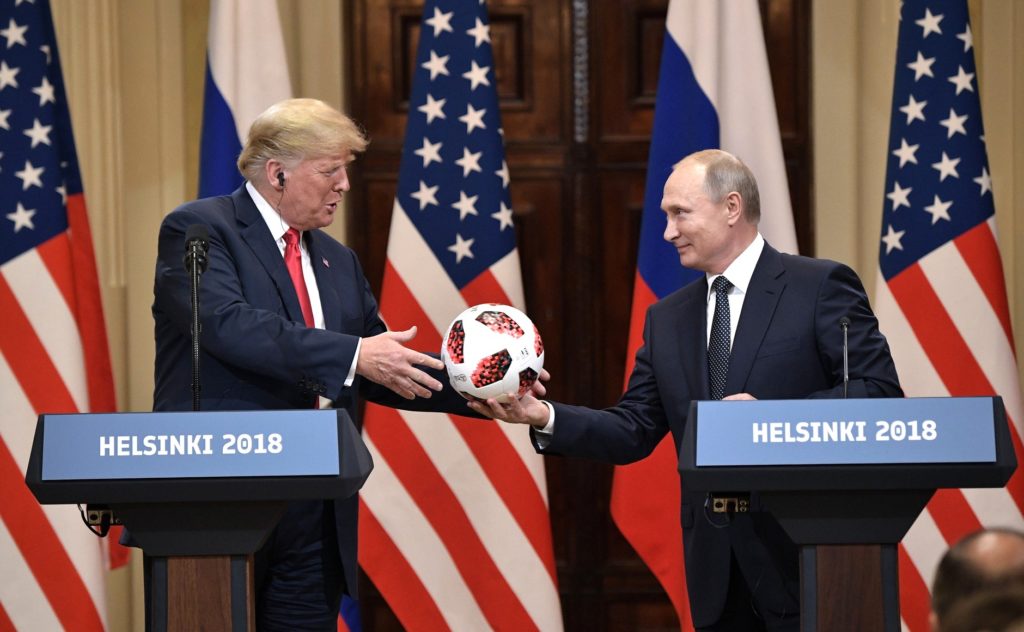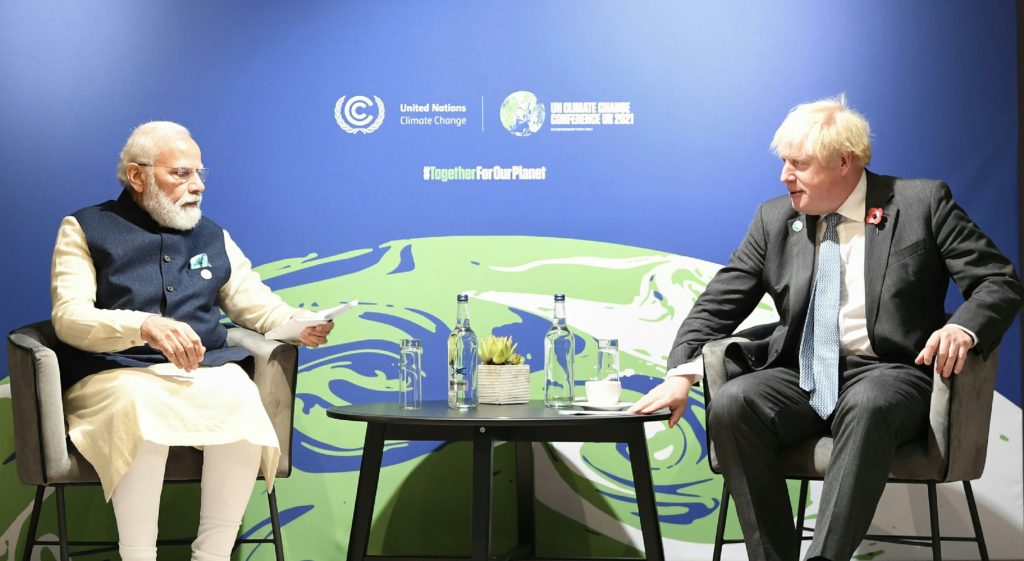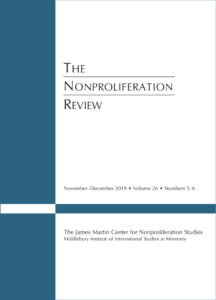October 14, 2022
Sanaa Alvira
One of the most significant developments of recent times has been the global rise of populism. In research published in the Nonproliferation Review, Oliver Meier and Maren Vieluf explore particular aspects of this phenomenon—the emergence of leaders they classify as “nationalist populists” in countries that are “at the core of the nuclear order.” Now that nuclear arsenals are in the hands of such leaders, “[t]he view that a few responsible nuclear-armed states guard against irresponsible behavior by states mostly peripheral to the nuclear order is no longer defensible, if it ever was,” the two scholars say. Focusing their analysis on four former and current world leaders—Donald Trump in the United States, Boris Johnson in the United Kingdom, Narendra Modi in India, and Vladimir Putin in Russia—Meier and Vieluf explore three ways nationalist-populist leaders effectively increase nuclear dangers through their foreign and defense policies.

Photo 1: Russian President Vladimir Putin presents US President Donald Trump with a gift of a soccer ball in Helsinki on July 16, 2018. (Source: Shutterstock.com)
Loose talk and risky actions
First, such leaders talk about nuclear weapons very loosely and strongly. Using exaggerated and emotional rhetoric, nationalist populists aim primarily to please their domestic political base. Second, nationalist populists tend to be unpredictable when making decisions regarding nuclear weapons. They are willing to take risks, disregarding the more cautious advice of their expert advisers. Finally, nationalist populists focus on short-term gains, disregarding international institutions and ignoring long-term implications.
Arguments that nuclear weapons could have a restraining effect on leaders’ immoderate behavior have little credibility when the leaders in question are nationalist populists, according to Meier and Vieluf. Such leaders also are unreliable with regard to security guarantees and other international obligations; furthermore, “populists are less likely to inform allies, let alone consult them, on nuclear issues.” In short, nationalist populism is corrosive to alliances and to the international order more broadly—even more so when nationalist-populist leaders have access to nuclear weapons.
In delineating the issue, Meier and Vieluf note that are no easy remedies, and they argue that “wait[ing] the populists out” is unlikely to be a successful strategy. For them a “strategy to deal with the challenge posed by nationalist populists must start by recognizing that we cannot assume that nuclear weapons are safe in the hands of some states but not in the hands of others.”

Photo2: Indian Prime Minister Narendra Modi and UK Prime Minister Boris Johnson meet on November 1, 2021, during the climate summit in Glasgow. (Source: Shutterstock.com)
Who is a nationalist populist?
Four commentators critiqued the essay from a variety of angles. Rajeswari Rajagopalan agrees that nationalist populists show a distinct attitude toward foreign and defense policies, but she questions whether they have such a large impact on nuclear decision making. She finds it surprising that Meier and Vieluf did not categorize Chinese President Xi Jinping as a nationalist populist, since the Chinese Communist Party cares a great deal about maintaining legitimacy in the eyes of the public, despite not having an electoral process. She also wonders why Pakistan and its leadership were not included in the list. Nationalist populists’ loose talk about nuclear weapons and its subsequent effects must not be exaggerated, she warns. For example, while Modi might have made an offhand remark about India’s nuclear weapons, there is no indication that it has led to a formal change in India’s nuclear doctrine. This is not to underestimate the threat of nuclear dangers that such statements can pose, Rajagopalan says, but at the same time, we have not seen any new state pursuing nuclear weapons in response to such rhetoric. Instead, the aggressive behavior of nuclear powers and other real security concerns seem to be important factors in pushing states to attempt to acquire nuclear weapons. Her bottom line is that while nationalist populists present potential dangers, the greater focus should be on “aggressive authoritarian states that are increasing the insecurity of their smaller, weaker neighbors.”
While commending Meier and Vieluf for making an argument that is “interesting and original,” Michael Cohen suggests that their definition of nationalist populism needs to be further refined. Meier and Vieluf argue that their concept of nationalist populism is different in important ways from Jacques Hymans’s oppositional-nationalist identity conceptions, but Cohen says the distinctions need to be clearer. He would like, for example, “a better sense of the indicators or words in speeches [by nationalist-populist leaders] one would look for to empirically disentangle the two.” Responding to the claim that an important feature of nationalist populism is the tendency to engage in polarization, romanticizing of the historical past, personalistic leadership, national sovereignty, and iconoclasm, Cohen asks, “How much do such leaders have to undermine or ignore alliances, international institutions and organizations, free trade, and cultural globalization, and in what ways, to count as nationalist populists?” There are many examples of other leaders “making such statements and often making such moves,” he says. Cohen also wonders whether the phenomenon of nationalist populists with nuclear arsenals is really new, citing Richard Nixon, Charles De Gaulle, Mao Zedong, and Indira Gandhi. And he addresses the claim that nationalist populists increase nuclear dangers because of the way they make decisions: one problem with that argument, Cohen says, is that it is difficult to tell if the decision making and the resulting danger stem from nationalist populism or from “a spate of other psychological and organizational biases.”
Relative risks
Jacques E. C. Hymans argues in his essay that Meier and Vieluf overvalue the virtues of the current nuclear-armed establishments and underestimate the dangers of nuclear-armed populists. In making the first claim, Hymans says that these establishments hardly provided a model of good nuclear behavior; they “made the Cold War more dangerous, more costly, and more long-lasting than it needed to be.” He warns against “the trap of zero-sum thinking, according to which any point against the populists becomes a point in favor of the establishments (or vice versa).” In support of his second claim, Hymans offers three hypotheses on the deterrence consequences of internally divisive populist governments: first, populists are likely to be insensitive to nuclear attacks in regions of political strongholds of their domestic opponents; second, populists will exploit a crisis by seeking concessions from their domestic opponents in exchange for an adequate response to a nuclear threat; and third, the establishment’s attempts to curb the excesses of nationalist populists could itself increase deterrence instability. To illustrate the last point, Hymans cites the response of General Mark Milley, the chairman of the Joint Chiefs of Staff, to concerns about the possibility that Trump would launch a nuclear attack against China: “Essentially, Milley was saying that if push came to shove, the military would mutiny. Meier and Vieluf seem to think that Milley did the right thing (pp. 15–16). Maybe so, but he also set an ominous precedent.”
Nina Tannenwald endorses Meier and Vieluf’s discussion of the danger in loose talk about nuclear weapons. Such talks, she says, “normalizes nuclear weapons and increases the risk of nuclear use.” But she adds that “while discourse can ratchet up the nuclear threat, discourse can also reduce it.” Trump, on one hand, increased the threat of a nuclear war with North Korea with his inflammatory comments against Kim Jong Un. On the other hand, when it was politically expedient to him, the US president tamped down the rhetoric and even stated, “There is no longer a nuclear threat from North Korea.” Turning to Ukraine, Tannenwald says that Putin’s “bellicose talk” has “greatly increased the level of nuclear danger in the conflict.” Meier and Vieluf argue that nationalist populists generally have the effect of weakening alliances and international institutions but note that “nationalist-populist challenges from the outside can increase alliance cohesion.” Tannenwald points to the Russian invasion of Ukraine as a dramatic example of the latter. However, she argues, “if Trump were president now instead of Joe Biden, this outcome would have been very different.” The combination of two nationalist populists, Trump and Putin, could have led to the “dismantl[ing of] the transatlantic institutional order.”
Editor’s note: In his response, Jacques Hymans describes the Meier-Vieluf article as “agenda-setting”; we think that’s a well-chosen term for an essay that launches a discussion of an important topic, rather than offering the final and definitive word on it. If you would like to contribute to that discussion, please see our submission guidelines. The four responses, and Meier and Vieluf’s response to them, are fully accessible (temporary free access) through December 31, 2022. The original Meier-Vieluf article has been published with permanent open access.
About our journal
The Nonproliferation Review is a refereed journal concerned with the causes, consequences, and control of the spread of nuclear, radiological, chemical, and biological weapons. The Review features theoretical analyses, historical studies, viewpoints, and book reviews on such issues as state-run weapons programs, treaties and export controls, safeguards, verification and compliance, disarmament, terrorism, and the economic and environmental effects of weapons proliferation.
The Nonproliferation Review is produced at the Washington, DC offices of the James Martin Center for Nonproliferation Studies, Middlebury Institute of International Studies at Monterey. The journal is published by Taylor & Francis.

